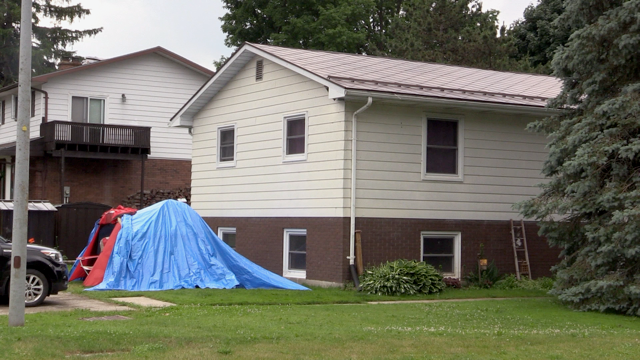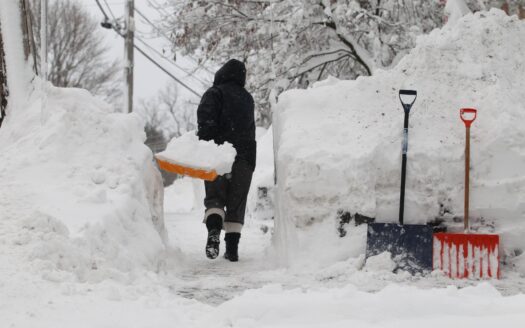Renovicted Tenants Face Uncertainty and Financial Strain
Becoming a part of a growing group of renovicted tenants is a distressing reality for many in southwestern Ontario, as property owners exploit renovations as a means to displace residents and increase rental prices. Julie Hamilton, a tenant residing near her old apartment on 295 and 301 William St., shares her unsettling experience of living in a tent just meters away from her former home (CTV News), which has been supposedly “under renovation” since January 2023.

The Never-Ending Renovation
According to Hamilton, despite six months passing by, the renovations have made little progress, except for changing the doorknobs and locks. To make matters worse, the tenants have not been provided with new keys to access their apartments. The renovation process has become an endless ordeal, leaving the tenants frustrated and anxious about their living situation.
In November of the previous year, the new landlords who purchased Hamilton’s building, as well as the neighbouring one, sent eviction notices to all eight tenants. At the time, the proposed renovations were expected to last only five to six weeks, allowing the tenants to return to their units at the previous rent of $550 to $600 per month, or a similar amount, once the renovations were completed.
However, the situation has taken a turn for the worse. Hamilton reveals that the landlord has decided to convert the two-bedroom apartments into one-bedroom units, altering the nature of the original dwellings. Consequently, if the tenants wish to reclaim their apartments, they will be faced with a new price tag of $1,600 per month, based on the premise of it being a new unit. The exorbitant increase in rent renders it impossible for the previous tenants, most of whom are on fixed incomes such as pensions or disability, to afford their own homes.
A Disheartening Reality for Renovicted Tenants
The impact of these circumstances is distressing for the affected tenants. Trish Schwehr, a fellow tenant who managed to stay in her apartment during the initial phase of renovations, expresses her deep frustration and impending eviction notice. The unavailability of affordable rental options and extensive waitlists for geared-to-income housing, which extend for over five years, leave these vulnerable tenants with little choice but to face homelessness.
The situation faced by these tenants is not only distressing but also unjust. Hamilton and Schwehr emphasize that despite their personal struggles, they are entitled to be treated as human beings. They decry the influx of large corporations purchasing properties in small towns like Wingham, which leads to escalating rent prices and diminishing housing options for low-income individuals. Their plea is simple: Acknowledge that everyone has a right to a decent place to live.

Ontario Makes New Proposal to Stop Renovictions
It doesn’t matter what side of the key you are on, the Residential Tenancy Act (RTA) in Ontario is, well, broken …read more
Uncertain Future for the Renovicted Tenants
Hamilton, who has been on disability for the past 20 years due to an acquired brain injury, realizes that her temporary accommodations may become permanent if she is indeed evicted from her apartment. The uncertainty of her situation weighs heavily on her, as she contemplates the looming possibility of losing the place she has called home for the past six years.
CTV News London made several attempts to contact Nick Sarai of VRS Property Management in Caledon, the owners of the properties on 295 and 301 William St. in Wingham, for comments. However, Sarai did not respond to CTV News London’s requests.
The plight of renovicted tenants in Wingham highlights the need for greater awareness and action to protect vulnerable individuals from housing insecurity and financial strain. The practice of renovictions, where renovations are exploited as a means to displace tenants and drive up rental prices, is a growing concern that demands attention.
The stories of Julie Hamilton and Trish Schwehr shed light on the emotional and financial toll faced by those affected. These individuals, who are already grappling with fixed incomes and limited housing options, find themselves caught in a disheartening cycle of uncertainty and instability.
It is imperative for the local authorities and housing regulators to address these issues and establish measures to protect tenants from unjust evictions and exorbitant rent hikes. Legislation should be implemented to ensure that renovations are carried out with transparency and accountability, without disregarding the rights and well-being of the residents.
Moreover, community support and advocacy play a crucial role in amplifying the voices of those affected by renovictions. By raising awareness about these injustices, the public can rally together to demand change and push for policies that prioritize affordable housing and the protection of vulnerable tenants.
Helping Renovicted Tenants is a Provincial Responsibility
The case of Wingham is not an isolated incident but rather a reflection of a larger systemic problem. Across the country, tenants face similar challenges, with their right to stable and affordable housing compromised by profit-driven practices. It is high time that society acknowledges the fundamental importance of safe and secure housing for all individuals, regardless of their socioeconomic status.
The plight of renovicted tenants like Julie Hamilton and Trish Schwehr in Wingham calls for immediate action and reform. Their stories underscore the urgency of creating a fair and inclusive housing system that safeguards the rights and dignity of all residents. By addressing renovictions and implementing effective measures to ensure affordable housing, we can strive towards a more equitable society where no one is left without a place to call home.



